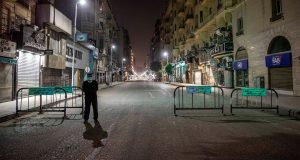
Staff Writer
President Abdul Fattah el Sisi on Monday revoked Egypt’s state of emergency, stating on Facebook that the country had become “an oasis of stability”. The state of emergency had been in place since April 2017, following church attacks which killed hundreds, and have been continuously extended, despite article 154 of the country’s constitution stipulating that it should have only lasted for a month and could only be extended once. It gave the police and security apparatus unlimited powers of arrest and detention, and has been used to crackdown on the already restricted freedoms.
Tens of thousands remain imprisoned for political reasons, while the only real opposition, the Muslim Brotherhood, continues to be labelled a terrorist group by the regime, its leaders have been arrested leaders, and much of its finances have been confiscated, crippling it’s operational capacity. The regime has also summarily executed individuals and ‘disappeared’ prisoners under the guise of ‘shootouts’, according to Human Rights Watch. This is aside from the hundreds who have been sentenced to death as a result of show trials, which in some instances had lasted only a few days.
Amendments to the country’s constitution allow Sisi to stay in power until the 2030’s, and to date the space for opposition has narrowed in the past years, with liberals, activists and journalists now being arrested as well as opposition politicians.
Speaking to Radio Islam International, Amr Magdi, a senior Middle East and North Africa researcher at Human Rights Watch, argued that although the revocation of the state of emergency was positive, the country had much yet to do. Laws panning peaceful protests, and those on counter terrorism, provide the regime vast powers to curtail basic freedoms, including political participation and freedom of expression, and will likely continue to do so despite the removal of the state of emergency; the state of emergency was just a coordination and culmination of these laws, which allow the regime to undertake almost everything it did during the state of emergency.
Magdi said, “it’s definitely a welcome step that the government has finally ended this nationwide state of emergency, which …. grants unchecked powers to security forces to detain [and] arrest anyone… for example, one of the first laws that were issued just weeks after the military coup in 2013 was the anti-protest law in November of 2013, which basically prohibits any form of peaceful gatherings. Tens of thousands of protestors and innocent people have been jailed… there’s also the counter terrorism laws that Sisi decreed in August 2015, which grants the president the power to act and undertake any necessary measures, including evacuating places, cutting transportation or telecommunications and so on and so forth”
Magd noted the rulings of the African Court on Human and People’s Rights decision, that the state of emergency contravened the African Charter on Human and People’s rights, arguing that Sisi had adopted these measures under pressure, and in an attempt to show a veneer of opening up and liberalizing: “This is what I, and many human rights defenders are concerned about, and what we believe is actually what the government has largely aimed at by ending the emergency status or the state of emergency.. It’s basically to export the image that things are changing.” He argued that international pressure was the only means of forcing the country to change course, but that some countries, including Italy, have placed political and economic calculations first.
In addition, Magdi noted the changing stance on Egypt by the Biden administration, which was initially critical of Egypt, but has in recent times been softening its stance as a consequence of Egypt’s mediation in the most recent Israeli invasion of Gaza in May. The current crackdown is unprecedented in Egypt’s modern history, and has seen tens of thousands arrested; it is qualitatively and quantitively different to previous periods of dictatorship between 1952 and 2011, according to Magdi.







0 Comments